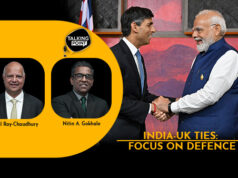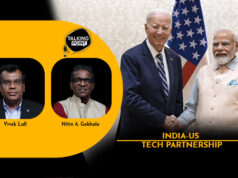New Delhi: China has been raising temperatures again in the West Philippine Sea, with a Chinese Coast Guard ship firing water cannon and blocking a Philippines Coast Guard vessel on a resupply mission to the Second Thomas or Ayungin Shoal in the Spratly Islands. In 2016, an international tribunal at The Hague backed the Philippines in its territorial claims over the contested waters, ruling that China had violated the Philippines’ sovereign rights. China says it will not abide by the ruling.
On ‘Talking Point’, Don McLain Gill, a Manila-based Geopolitical Analyst, Lecturer at the Department of International Studies, De La Salle University, Director for South & Southeast Asia at the Philippine-Middle East Studies Association and Co-editor, ‘The Elephant’s Rise In The East‘ speaks to StratNews Global Associate Editor Amitabh P. Revi.
Don McLain Gill points out, “this form of harassment along with other grey-zone activities that China continues to conduct within the Philippines Exclusive Economic Zone(EEZ) is aimed at provoking Philippines’ sovereignty rights directly without triggering any sort of military guarantees under the treaty alliance with the United States. China conducts a series of salami slicing activities, that involves hard and soft power, disinformation for example, to be able to slowly but surely alter the status quo without the use of military force. This is how it is trying to up the ante by engaging in a number of strategies that do not really involve the overt use of military force, which may trigger the commitments under treaty alliances. This is the same as what’s happening between the U.S. and Japan, and the U.S. and Australia against China’s assertiveness in the maritime domain.
The analyst adds, “China is just looking for a series of gaps in policy to be able to exploit. Fortunately, under the (President)Marcos Jr administration, the Philippines has shown a strong will, a strong position to proactively engage based on these security developments. Manila has also focused on enhancing its partnerships with non-traditional parties. This is where India also plays a significant role. The Philippines-India Strategic Partnership is well underway. It’s going positively and this is a great sign of proactivity from the government. India is stepping up its position, its role as a practical, significant security and development partner beyond the Indian Ocean region and into the Western Pacific. This is not going to go away. And I believe that the conditions are set both externally and internally for solidifying the partnership between the Philippines and India, particularly in the security realm.”
Watch the complete discussion for more on the history of China’s claims over virtually the entire South China Sea with its so-called ‘nine-dash” line, how it continues to disregard and violate international law including a 2016 UN Hague tribunal ruling, how the Philippines under President Ferdinand ‘Bongbong’ Marcos Jr is responding, India’s ‘Act East Policy, the significance of the first foreign export of the BrahMos supersonic missile system to Manila as a deterrent, Beijing exploiting weaknesses in the Association of Southeast Asian Nations(ASEAN), Manila’s military alliance with the U.S., U.S.-China confrontation and Beijing’s envoy “informally” offering joint military drills with the Philippines.
Related Links:




